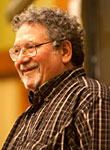Short PSA videos aim to get cooks to change their ways

"Ugly bugs" that can cause foodborne illness are in the spotlight as part of public service announcements released by Cornell and distributed by the nonprofit Partnership for Food Safety Education (PFSE).
Cornell's Departments of Communication and of Food Science joined forces to create the four 30-second, scientifically accurate videos that feature the importance of safe home food handling in keeping a family healthy. By using vignettes, the PSAs aim to change consumer behaviors, says Michael Shapiro, associate professor of media psychology and principal investigator; Robert Gravani, professor of food science, is co-principal investigator.
"Research indicates that most home cooks know about important home safe food handling recommendations but don't consistently act on them," says Shapiro. "Narratives are more engaging for people -- they remember them better and tend to counter-argue them less. Telling stories within each PSA also allowed us to show ordinary people making safe food handling a critical part of meal preparation."
PFSE, which works to reduce the incidence of foodborne illness and improve public health through research-based, actionable consumer food safety education initiatives, helped connect the Cornell researchers with food safety experts from government and industry as well as distributing the PSAs.
The PSAs are the culmination of a process that used a series of consumer focus groups of people who cook regularly for their family and friends to provide feedback at every stage of development, as well as surveys and experiments.

"One of the most interesting observations from some of our focus groups was that home cooks have strong needs to present themselves as a good cook and that some safe practices -- particularly using a food thermometer -- were actually associated with inexperience as a cook," said Shapiro. "These cooks liked realistic PSAs that depict what they might encounter in their daily lives and story characters that reflect the person ideally they want to be."
Later in the process, while audience members watched the PSAs, researchers at Indiana University's Department of Telecommunications and University of Missouri's School of Journalism measured their psychophysiological reactions, including heart rate, skin conductance and facial muscle activation. The audience also gave feedback on each PSA.
The two PSAs that did the best job of getting the message across and connecting with the audience were:
• "Chef Daddy," which shows how easy it is to keep things clean, keep cooked and raw foods separate, and cook and keep food at the proper temperature.
• "Ugly Bug," which addresses separating raw and cooked foods, how to check temperatures on small pieces of meat, how to use food thermometers and the risks of harmful pathogens to the elderly and the young.
Both can be viewed and downloaded at http://www.fightbac.org. Food retailers and health educators are encouraged to use the videos for in-store and community programming. Ideas for using the videos, quizzes and other content can be downloaded at the same site.
"The Cornell public service announcements give us a terrific, consumer-tested tool that can help us reach more consumers about why it is so important to consistently practice safe food handling at home," said Shelley Feist, PFSE's executive director. "We hope educators will utilize the PSAs to address the Healthy People 2020 objective to increase the proportion of consumers nationwide who practice the basic safe food handling behaviors of clean, separate, cook and chill."
The project was funded by the U.S. Department of Agriculture's National Institute of Food and Agriculture.
Media Contact
Get Cornell news delivered right to your inbox.
Subscribe